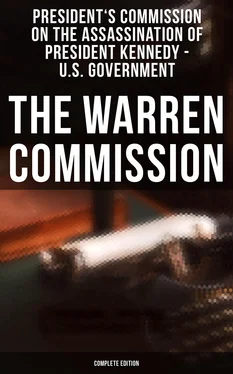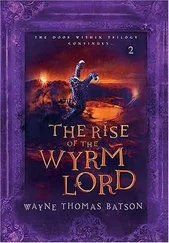What sticks in my mind is this one particular letter about Marina's uncle. The other two I am not quite sure.
Representative Boggs. What does it say about her uncle?
Mrs. Oswald. Well, I have to find the letter, sir.
I want to say this, gentleman. And maybe you are not in agreement with me. But all my life I have known and I have thought that a title does not make a man. It may be presumptuous of me that I am accusing the Secret Service—because they are the Secret Service. But there are men in our Government, and the Secret Service, who are undesirable, just like in any other organization—let's face it. We have such men as Bobby Baker, who was a citizen well thought of. Charles Van Doren who was well thought of. Mr. Fred Korth who was under investigation, he was a wonderful citizen. I can go on and on. Yet these men turned out not to be the right type.
I say this because my son was a self-styled Marxist, and a known defector, and that is why his guilt was proven by the Dallas Police. And my son—had he been a Senator or someone in the higher field, maybe they would not have picked him up so fast. Now, that is a fact of our way of life, of human nature. Having a title doesn't mean that you are the man back of the title.
Mr. Rankin. Could we take those letters now and have the reporter identify them? Here is the one about the uncle in the Army?
Mrs. Oswald. That is one I am sure of.
Now, I did not finish the story of the woman offering Marina a home. I have not finished that story, really. This affidavit that I showed you about the woman offering Marina the home the morning of the 28th—I picked up the newspaper and I read in the newspaper—I will be through with this story in 1 minute. I picked up the newspaper on the 28th of November and I read in the newspaper where this woman had offered Marina a home. So I said to the agent that was sitting up—everybody was sleeping, and as I told you I sat up all night——
Mr. Rankin. This was 1963, after the assassination?
Mrs. Oswald. 1963. November 28. It was on the 27th that I knew my daughter was offered a home. Nothing was said where. In fact, at the time I thought she was going to live in Mr. Gregory's home. I just thought that. I did not ask. I was so hurt, I did not ask.
But on the morning of the 28th I picked up the paper and read this story about the woman going to the Dallas Police offering Marina a home. So I said to this agent, "Evidently that is who Marina is going to live with." But I did not know. But on the 28th is when I saw the story of the woman offering Marina the home.
Mr. Rankin. Now, you have produced a number of letters that you described as being letters received from your son, Lee Oswald, while he was in the Soviet Union.
Mrs. Oswald. Yes, sir.
Mr. Rankin. And we have asked you if you could identify the three letters that the Secret Service brought back to you and asked you to give a receipt for. You said it is very difficult, if not impossible, for you to do that. Is that right?
Mrs. Oswald. No, sir, I did not say that. I said that one letter I was sure of, because it stated that her uncle was an officer in the Soviet Union. That letter I am sure of. The other two letters—I would have to go through the letters. I think I could spot them, because it would be of importance to our country and the Secret Service to know—in other words, it was important for them to know she had an uncle in the Soviet Union. And the other two letters would be on that order. And I believe maybe I could—I would not want to state a fact that these two letters—I think I would be pretty close to choosing the other two letters as the proper letters.
Mr. Rankin. Mrs. Oswald, I wonder if it would be agreeable to you if we would identify all of those letters that you received from your son while he was in the Soviet Union, and then possibly when we recess you could look them over and see——
Mrs. Oswald. Yes, sir, that's perfectly all right.
Mr. Rankin. See if you can pick out the ones you gave a receipt for.
Mrs. Oswald. That is perfectly all right. Any way you want to do it is all right with me.
Mr. Rankin. Mr. Reporter, I will ask you to mark them, and Mr. Liebeler, will you help in the marking, because the letters are covered with glassine, and it may be hard to mark them with ink. I think by putting those stickers on we can help you.
Mrs. Oswald. Not all of the letters have dates. I think by taking the date on the back of the envelope it would be all right. And we had them in order. I don't know if they are still in order. But we had them by the dates.
Mr. Rankin. Mr. Reporter, I offer in evidence Exhibits 170 to 179, both inclusive, being pictures of the funeral and the casket that Mrs. Oswald has produced here for the Commission, and ask leave to substitute copies.
The Chairman. They may be so introduced.
(The photographs referred to were marked Commission Exhibits Nos. 170 to 179 inclusive for identification, and received in evidence.)
Mr. Rankin. I then offer the various letters that Mrs. Oswald produced, that she said were sent to her by her son, Lee Harvey Oswald, from the Soviet Union. And I think it would be better for our record if I briefly state the date that the envelopes bear in each case, so it can be compared with the number.
The Chairman. Very well.
Mr. Rankin. Exhibit 180 bears the date of July 18, 1961, on the envelope.
Mr. Dulles. Mr. Rankin—is that the American or the Russian postmark?
Mr. Rankin. That is the American postmark.
Mr. Dulles. Time of receipt in this country?
Mr. Rankin. That's right.
Now, Mrs. Oswald, I understand from you there was one letter before the letter bearing the date July 18, 1961, on the American postmark on the envelope, and you do not have that here?
Mrs. Oswald. I may have it. I have many more papers and documents. I have a suitcase almost full that I have not yet opened. The suitcase was lost. We did not receive it until about 9 o'clock last night.
Mr. Rankin. You have not produced it today, though.
Mrs. Oswald. No. But there is one more letter. It is the very first letter I received from Lee.
Mr. Rankin. I call the attention of the Commission to the statement in Exhibit 180, "She was living at her aunt's place when I met her. They are real nice people. Her uncle is a major in the Soviet Army."
Exhibit 181, dated August 3, 1961, was the envelope postmarked United States, August 10, 1961. I also offer that.
Exhibit 182, dated October 2, 1961, with the American postmark October 10, 1961. I also offer that.
In each case, Mr. Chairman, I ask leave to substitute copies in accordance with our understanding.
The Chairman. Yes. We will make a blanket ruling on all of them when you finish.
Mr. Rankin. Yes, sir.
Exhibit 183, dated October 22, 1959, with the American postmark on the envelope October 30, 1961. I offer it.
Mr. Dulles. Did you say 1959 and then 1961?
Mr. Rankin. '61——
Mr. Dulles. It is all '61?
Mr. Rankin. You are correct—October 22, 1959, is the date on the letter.
Mrs. Oswald. That is incorrect.
Mr. Rankin. And on the envelope it is October 30, 1961, Vernon, Tex. Mrs. Oswald, can you explain that?
Mrs. Oswald. Yes. Evidently Lee put the date incorrect—because I had no contact with Lee from the time—I had one contact with Lee from the time that he defected to Russia. And the only contact was when he was at the Metropole Hotel in Moscow. Then the next contact was when the State Department wrote me his address, which was July, or June 1961. So where Lee put the 1959, I would say it was just an error, because the postmark proves the date.
As I have been saying FBI instead of Secret Service—I mean it is just——
Mr. Rankin. A slip of some kind?
Читать дальше












